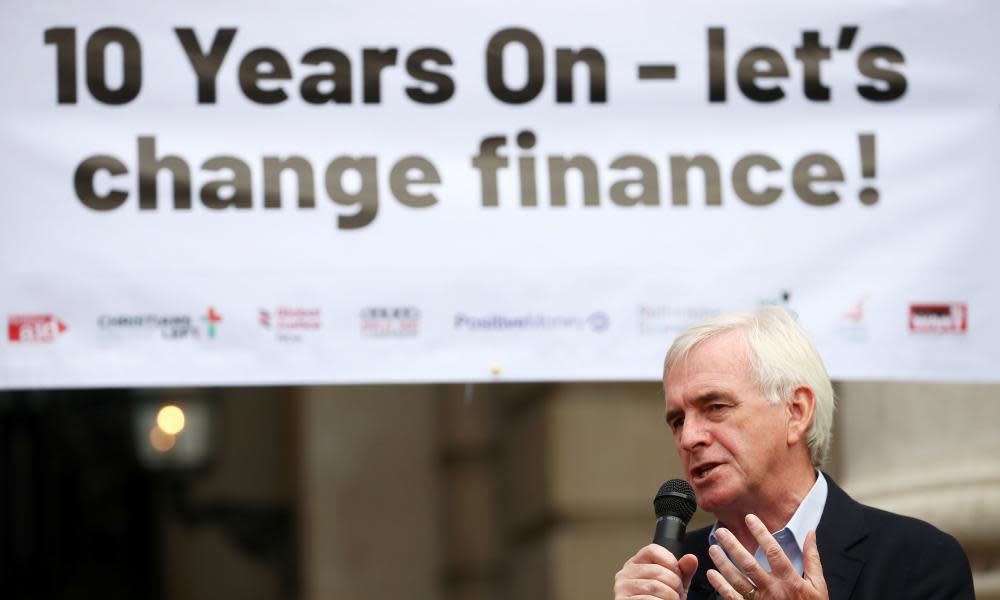The Observer view on Labour’s economic policies

Ten years on from the financial crisis, it is astonishing how little has changed. It should have been a moment of reckoning for the British economy, a chance to address structural weaknesses so painfully exposed by global crisis: a financial sector too big to fail; a corporate sector blighted by short-termism; unsustainable, debt-fuelled growth; gaping wealth and regional inequalities.
The Observer is the world's oldest Sunday newspaper, founded in 1791. It is published by Guardian News & Media and is editorially independent.
Not only did that moment never come, these weaknesses have been further compounded by almost a decade of austerity and Conservative economic failure. Many low-income working families are actually worse off than they were a decade ago. The contrast between the booming prosperity of central London and the lethargy of provincial high streets has never been starker.
However, we are now seeing a shift in the mood music. Just a few years ago, Ed Miliband was ridiculed for advocating an energy price cap to rein in a fundamentally uncompetitive market. Today, a radical package of economic reforms from the thinktank IPPR has won the endorsement of a diverse coalition, including business leaders. Popular dissatisfaction with austerity is more pronounced than ever. This sets the scene for a break from the recent economic consensus. And as it gathers in Liverpool for its annual conference, Labour, it is clear, is enthusiastically embracing the insight that uncompetitive markets characterised by asymmetric power churn out inefficient and unfair outcomes.
There is much to welcome in the party’s economic agenda. Labour is right to argue for renationalisation of the railways and water, where badly executed privatisation has been terrible for consumers. The success of Network Rail shows that, with leadership and accountability, nationalisation can deliver real benefits. Labour’s plan to boost workers’ rights – and put resources into enforcing them – is long overdue, given the growth in low-paid, insecure work. Funnelling £250bn of investment into our infrastructure, which has suffered from decades of underinvestment, makes good sense considering the low rates at which government can borrow. And the party is absolutely right to commit to raising taxes on businesses and the most affluent to fund spending on education and health.
There are, however, some big gaps and questionable priorities. Tax and spend, nationalisation and intervention are all comfort-zone stuff for the left. There hasn’t been enough creative thinking outside it. Why is Labour happy to spend billions to further subsidise the university education of a predominantly middle-class group of young people, while having so little to say about what it would do for the young people who don’t go to university? Beyond investing more in public services, it has little to say about how it would equip them for the fundamental challenges of our time, such as an ageing society or geographical educational inequalities.
On the changing nature of work, the party would be better off ending its flirtation with a universal basic income and, rather than offering a compensatory cash handout to those who will lose their jobs to robots, develop proper plans to retrain them. It should make boosting trade union powers a quid pro quo for unions addressing their shamefully poor membership rates among the low paid. And while a four-day working week might be a flashy manifesto prospect, Labour should be more focused on closing the gender gap in part-time working, exploring ways of encouraging more men to work flexibly and part-time. Gender pay equality won’t happen without it.
But all this is just a pipe dream unless Labour can win an election. The disgraceful lack of leadership that Jeremy Corbyn has shown in the face of the party’s antisemitism crisis is letting Labour down and has gravely impeded it in doing its job of opposition. And Labour must also openly acknowledge that the cost of Britain leaving the EU will be felt most by its own voters. It has not done so for fear of damaging its electoral prospects, but at what cost? The recession that would follow a chaotic Brexit would ensure economic reform remains a distant prospect whoever is in Number 10.

 Yahoo News
Yahoo News 
